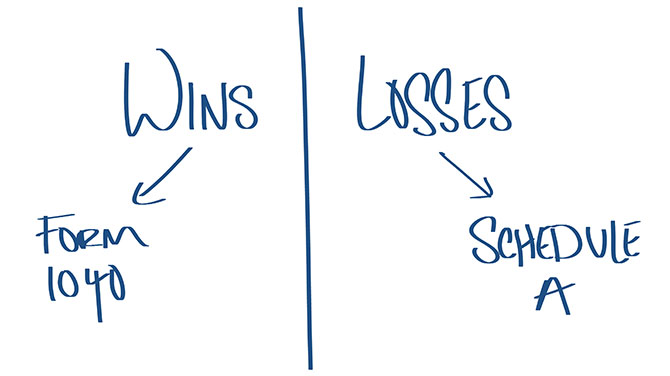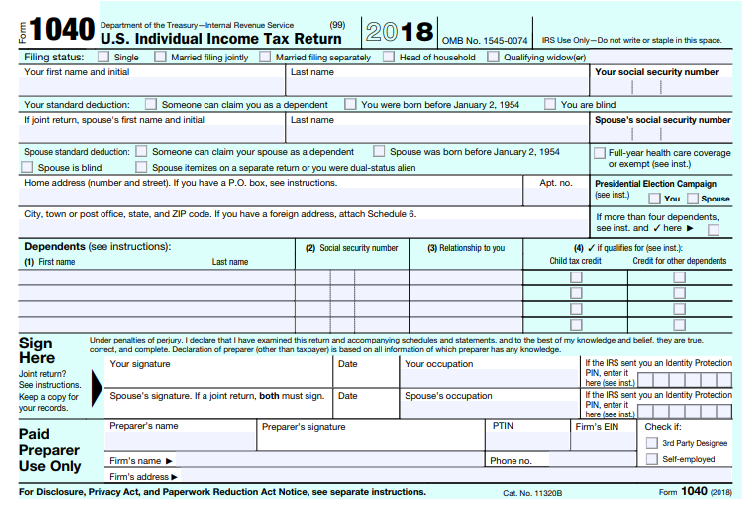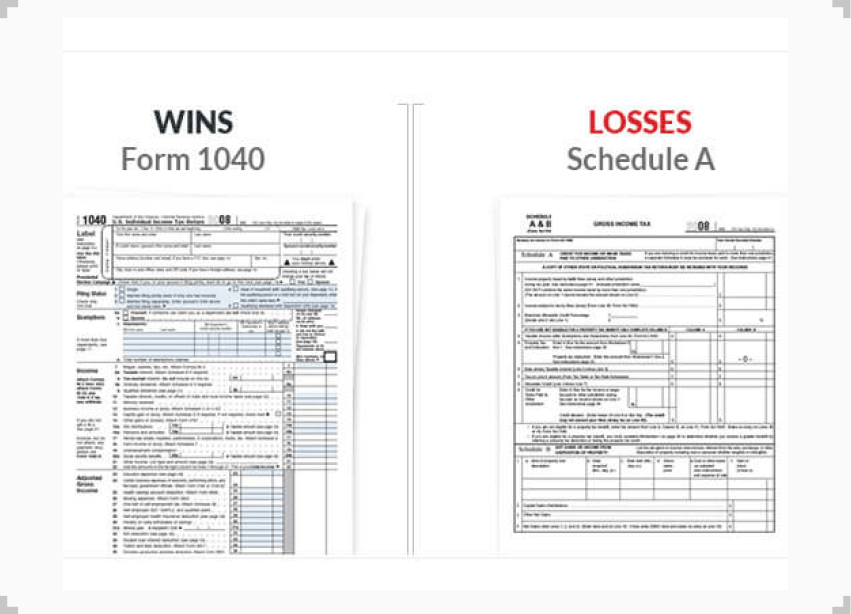Where To File Gambling Winnings On 1040
- Where To File Gambling Winnings On 1040 Tax Form
- Where Do You Claim Gambling Winnings On 1040
- Where To File Gambling Winnings On 1040
- Where Are Gambling Winnings Reported
Nov 21, 2018 You must report lottery and gambling winnings on your 1040 at Line 21, Other Income, even if you aren't issued a Form W-2G. Deducting Gambling Losses to Reduce Taxable Income Lottery winnings are a type of gambling winnings, and the money you spend to buy lottery tickets are treated like gambling losses for tax purposes. Thus gambling winnings should be considered in the same income section of the 1040 form and the losses up to the amount of the winnings would be indicated on the second line. The gambling winnings would then be determined by subtracting losses from winnings.
- Due to federally declared disaster in 2017 and/or 2018, the IRS will allow affected taxpayers an extended filing date to file and pay for their 2017 taxes. See IRS.gov for details. Free ITIN application services available only at participating H&R Block offices, and applies only when completing an original federal tax return (prior or current.
- You should also keep receipts, payout slips, wagering tickets, bank withdrawal records, and statements of actual winnings. You may also write off travel expenses associated with loss, so hang on to airfare receipts. Use TaxAct to file your gambling wins and losses. We’ll help you find every advantage you’re owed – guaranteed.
- For a Canadian resident that is not engaged in the U.S. Trade or business of gambling, the winnings and losses are reported on Schedule NEC of Form 1040NR. On Schedule NEC, there are line items for gambling winnings specifically for Canadian residents. Gambling winnings and losses are separately stated line items for Canadian residents.
Taxes are probably the last thing on your mind during an exciting gambling session. However, they inevitably come up following a big win or profitable year.
You may have two main questions at this point:
- Do I need to pay taxes on my wins?
- If so, how much do I have to pay?
The following guide discusses whether your gambling wins are taxable and other important topics regarding this subject.
The Short Answer Is Yes
I’ll cut right to the chase: yes, you do need to pay federal taxes on gambling winnings in the United States. This is especially true when you net a big win and receive a W-2G form.
According to the IRS, a gambling establishment should issue a W-2G when you win an amount that’s subject to federal income tax withholding (24% of win).
Slot machines present a famous example of when you’ll receive a W-2G form after winning so much. Casinos must issue a form when you win a prize worth $1,200 or more through slots or video poker.
As for the second point, a sportsbook or racetrack must withhold federal taxes when you win a bet worth 300x your initial stake. If you wager $5 and win $3,000, for example, then the bookmaker will issue a W-2G form and withhold $720 (24%).
Here’s a broader look at the W-2G and tax withholding threshold for different types of gambling:
- $600+ through sportsbooks and racetracks (provided it’s 300x your stake).
- $1,200+ through a slot machine, video poker machine, or bingo game.
- $1,500+ through keno.
- $5,000+ through a poker tournament.
All Winnings Are Subject to Taxation
Technically, you’re supposed to report any gambling winnings—big or small. Even if you win $20 in an office betting pool, the IRS wants to know about it.
If you want to stay above board, then you should report all wins on Form 1040 (under “other income”). As I’ll cover later, you can deduct losses from winnings as well.
Furthermore, any amount that’s withheld by a casino, poker room, sportsbook, or racetrack is deducted from what you owe. Gambling establishments keep 24% of a win when they do withhold money.
W-2G Forms Don’t Apply to Table Games
You’ll receive a W-2G when earning big wins through most types of gambling. However, casino table games are an exception to the norm.
Unlike a jackpot game (e.g. video poker) or a poker tournament, casinos have no idea how much money you start with in a table game. Therefore, they can’t really determine when you do and don’t experience big wins.
Examples of table games that are exempt from W-2G forms include:
- Baccarat
- Blackjack
- Caribbean stud
- Craps
- Roulette
- Three-card poker
The IRS still expects you to pay taxes on profits earned through table games. Again, though, the casino can’t issue a W-2G because they can’t tell how much money you’ve actually won.
Some States Tax Gambling Winnings
Most states tax your income, including gambling winnings. Depending upon where you live, you’ll probably need to pay taxes to both the IRS and your state.
For Example:Michigan features a 4.25% flat income tax. The Wolverine State expects you to pay this same 4.25% rate on gambling wins.
West Virginia, on the other hand, doesn’t tax your winnings. Casinos/sportsbooks in the Mountaineer State only withhold federal taxes (when necessary).
Assuming you travel to another state to gamble, you may have two states wanting taxes. Luckily, though, you won’t be subject to double taxation.
Instead, your home state will give you credit for whatever taxes are paid to the state where the winnings occurred.
Can You Deduct Losses?
You can deduct gambling losses from winnings. However, these deductions are itemized rather than standard deductions.
Here’s an example to explain:
- You win $5,000 through sports betting.
- You lose $4,500.
- You must report the full $5,000—not $500 (5,000 – 4,500)—under other income.
- Meanwhile, the $4,500 is reported through various itemized deductions.
In short, itemized deductions are expenses that reduce your taxable income. The standardized variety includes flat-dollar, common deductions.
You may be able to save more money through itemized deductions. However, standard deductions are easier to deal with and also have the potential to save you more money.
Regardless, you must use itemized deductions when dealing with losses. This means spending more time on your tax returns or working with an accountant.
Keep in mind that you won’t receive a tax refund for gambling losses. Instead, you can only deduct an amount equal to your winnings each year. If you win $3,500, for example, then you can’t deduct more than $3.5k and expect a return.
Keep Records on Wins & Losses
The IRS may take your word at face value when it comes to gambling. Of course, they also have the ability to audit you when they deem it necessary.
That said, you don’t want to guestimate on your wins and losses. Instead, you want proof through the form of records.
Journals offer a great way to record your gambling activities. You can log the following for each entry:
- Date of gambling session
- Location of the establishment
- Game played
- Starting bankroll
- Ending bankroll
Such entries don’t guarantee you’re being honest. However, they at least show the IRS that you’re making a legitimate attempt at recordkeeping.
You can take your recordkeeping efforts even further by holding onto any other relevant documents. Betting slips, winning tickets, canceled checks, bank statements, W-2G forms, and anything else of relevance are all worth saving.
What Happens If You Don’t Report Gambling Winnings?
The IRS fully expects you to report gambling winnings and especially annual profits. They don’t take kindly to you failing to report these wins.
Of course, you’re unlikely to draw an audit for winning a $25 sports bet. You stand a higher chance of being audited, though, if you win enough for a W-2G form.
In this case, the casino/sportsbook/racetrack also sends a copy of the from to the IRS. The latter features reliable software that can match up your reported income with documentation of nonreported income.
Assuming you fail to report gambling winnings, then the IRS may do little more than send a letter and issue a small fine. You should definitely pay up, or at least work out a payment plan, in this case.
You’ll face more serious consequences, though, if you fail to report a huge win and lie about the matter when/if caught. Refusal to pay and/or heavy efforts to cover up the deceit will lead to bigger fines and possibly jail time.
Gamblers Stand Increased Chances of an Audit
Nobody likes attracting an audit from the IRS. Unfortunately, the chances of being audited increase for gamblers.
This is especially true when you net a big win and receive a W-2G. Of course, you can reduce the odds of being audited by claiming anything on the form.
The IRS may also become suspicious if you claim big losses on your tax return. You’ll put the taxman on increased alert when winning a huge prize (e.g. $50,000) and claiming a matching amount of losses.
/ScreenShot2020-02-03at11.03.26AM-e376b945aa4e4b7381f63b10e4de9cc2.png)
Also, you can’t write off hotel stays, meals, and entertainment as a casual gambler. You must be a professional to claim such itemized deductions.
How Do Professional Gamblers Report Winnings?
Pro gamblers claim winnings on Schedule C as a self-employed person rather than as other income on Form 1040.
Even as a professional, you can’t deduct more losses than winnings in a year. You’re stuck in a tough situation with treating gambling as a day job, yet not being able to file losses that exceed winnings.
As mentioned before, though, you’re able to deduct business expenses like hotel stays and meals. These expenses just need to be a legitimate part of your business.
Conclusion
In answer to the original question, yes, you’re supposed to claim real money gambling winnings on federal tax forms. Even if you end up losing money on the year, the IRS wants to see your wins and losses.
Of course, tax collectors don’t care a great deal when you win $200 on the year. They spend most of their time looking for bigger winners.
The times when you want to be especially diligent in this matter include:
- When you book a large win and receive a W-2G form.
- If you win a significant amount of profits throughout the year.
- When you win 600x your bet with a sports or horse wager.

Again, the IRS and your state (if applicable) expect all gambling winnings to be reported. But you can use some commonsense in deciding when reporting wins are truly necessary.
Please enable JavaScript to view the comments powered by Disqus.We think it's important for you to understand how we make money. It's pretty simple, actually. The offers for financial products you see on our platform come from companies who pay us. The money we make helps us give you access to free credit scores and reports and helps us create our other great tools and educational materials.
Compensation may factor into how and where products appear on our platform (and in what order). But since we generally make money when you find an offer you like and get, we try to show you offers we think are a good match for you. That's why we provide features like your Approval Odds and savings estimates.
Where To File Gambling Winnings On 1040 Tax Form
Of course, the offers on our platform don't represent all financial products out there, but our goal is to show you as many great options as we can.
This article was fact-checked by our editors and Jennifer Samuel, senior product specialist for Credit Karma Tax®.
Gambling may just be a hobby to you, but there’s nothing casual about it when it comes to filing your federal income taxes.
Nearly two-thirds of Americans gamble, according to a 2016 Gallup poll. And while you might think that winning a few bucks from a scratch ticket or a weekend trip to Vegas isn’t a big deal, the government considers every dollar you win from gambling as taxable income.
As a result, it’s important to understand how to report your gambling winnings, what to include and how you can use your losses in your favor. Here are some things you should know about how gambling winnings are taxed.
1. You must report all your winnings
Depending on how much you won during the year, you may receive a Form W-2G listing your gambling winnings. But even if you don’t receive the form, you’re still required to report all your winnings as “other income” on your tax return.
“All cash and non-cash gambling winnings are taxable and should be reported as ‘other income,’ ” says Patrick Leddy, partner at Farmand, Farmand & Farmand LLP. This includes any winnings you received from casinos, lotteries, raffles or horse races. Non-cash winnings, such as prizes like cars or trips, are also considered taxable income and are taxed based on their fair market value.
To make sure you keep track of both your winnings and losses, record the following details every time you gamble:

- The date and type of your gamble or gambling activity
- The name and location of the gambling establishment
- Names of other people who were with you, if applicable
- How much you won or lost
- Related receipts, bank statements and payment slips
2. You can deduct some losses
No one likes to talk about how much money they lost gambling. But when it comes to your tax return, being honest can save you money. That’s because the IRS allows you to deduct gambling losses.
Though you may not be able to deduct all your losses.
“Taxpayers can deduct gambling losses only up to the amount of their gambling winnings,” says Leddy, “and only if they itemize their deductions.”
Where Do You Claim Gambling Winnings On 1040
For example, if your gambling winnings totaled $5,000 in the tax year, but you lost $6,000, you can only deduct $5,000 of those losses. Keep in mind, itemizing your deductions may not afford you the maximum tax benefit. If your total itemized deductions — which can also include charitable donations, home mortgage interest and medical expenses — don’t exceed your standard deduction, itemizing might not be the optimum choice for you.
Can I deduct the cost of a gambling addiction recovery program?
IRS Publication 502 lists alcohol and drug-related addiction-recovery programs as eligible for the medical expense deduction. However, gambling addiction isn’t included. If you need help dealing with a gambling addiction, you can call the Substance Abuse and Mental Health Service Administration’s 24/7, 365-days-a-year hotline at 1-800-662-4357.

3. Even illegal gambling winnings are taxable
Where To File Gambling Winnings On 1040
According to the American Gaming Association, it’s estimated that Americans spend more than $150 billion per year on illegal U.S. sports betting — and yes, that can include your office March Madness pool.
A May 2018 U.S. Supreme Court ruling opened the door for states to legalize sports betting, but not all have done so. That said, any winnings you receive from betting on sports legally or illegally (or from any illegal activity, for that matter) are still taxable.
Learn more about sports betting and taxesBottom line
Where Are Gambling Winnings Reported
So how are gambling winnings taxed? Every dollar you win from gambling, whether legally or not, is considered taxable income. As a result, it’s critical that you keep a record of your winnings so that you can report them accurately. You’ll also want to keep track of your losses so that you can use them to qualify for a tax break.
Once you’re ready to file your taxes, Credit Karma Tax® can help show you where to include both your winnings and your losses so that you can maximize your tax refund if you’re owed one.
Jennifer Samuel, senior tax product specialist for Credit Karma Tax®, has more than a decade of experience in the tax preparation industry, including work as a tax analyst and tax preparation professional. She holds a bachelor’s degree in accounting from Saint Leo University. You can find her on LinkedIn.